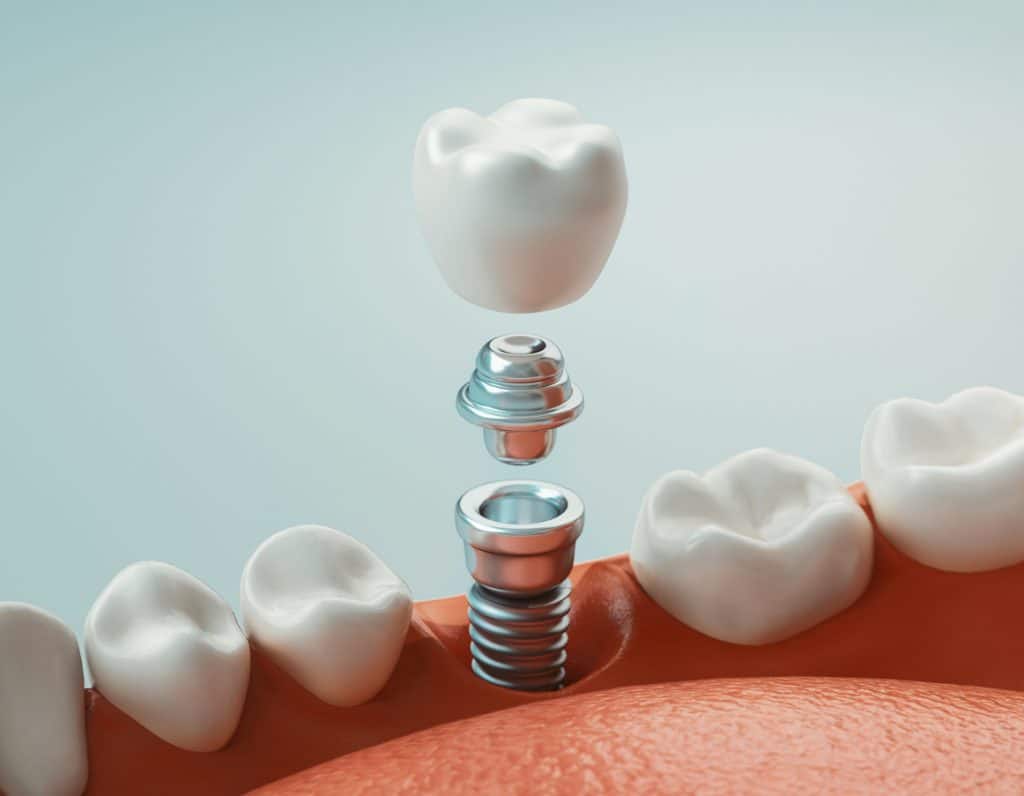Whether it’s a failure to take proper care of their teeth, a sports injury, or one of many possible scenarios that can result in tooth decay or damage, lots of people find themselves in need of a replacement tooth. As a result, they require a dental implant to serve as a foundation for the dental prosthesis that’ll replace the lost or damaged tooth. What does this entail? Well, you’ll need a surgical procedure to get a high-quality dental implant integrated with the bone of your jaw. When you experience tooth decay or tooth damage, you need professional intervention. Here are some useful details that will help you on your journey to getting dental implants.

What are dental implants made of?
Dental implants are composed of a titanium screw and a connecting element known as an abutment, which will be added to the implant. Other materials can be used, but titanium is the most common because it’s more durable than other materials like ceramic, for instance. The abutment will be used to connect the dental prosthetic to the implant, which is why a reliable material needs to be used. A metal prosthetic implant abutment certainly provides a solid foundation for a dental prosthesis.
How do dental implants work?
Gaining a deeper understanding of the dental implant process can help ease any worries you may have going into the procedure. So, what should you expect? Well, an implant is a surgical component that is interfaced with the bone of the jaw, as explained above. This involves the drilling of a hole to insert the implant between two adjacent teeth then adding a dental prosthesis to create a replacement tooth.
The implant acts as a form of support for the prosthesis. It’s not the visible part of the tooth – it’s purely functional. It’s the foundation of the replacement tooth. An implant essentially mimics a natural tooth root.
Before the prosthesis can be added to the implant, you will have to recover from the initial operation. Osseointegration is a process that takes time and after the integration of your dental implant to your jaw bone, you’ll have to wait for your gums to heal. The bone has to heal tightly around the implant, and this process can take months. You shouldn’t expect this to be a problem that can be solved in a single visit.
Getting a dental implant and a prosthesis is more of a transition than an immediate transformation. Healing is a crucial part of the process as you want your body to accept the implant. A dental implant is meant to be a permanent solution, after all.

How are dental implants performed?
A dental implant procedure is a complex process that requires planning and careful attention to detail at every stage. Before the actual operation takes place, your surgeon will conduct a dental exam. A surgeon will usually begin by making a guide from your teeth. This will help them to ascertain where they will need to position the dental implant. They might use an acrylic or plaster model to help them with this. You might even need a CT scan of your teeth if the procedure requires extra planning.
After the X-rays and 3D images have been done and models have been composed from your teeth and jaw, you’ll be ready for the medical review. It’s important to inform your dentist of any conditions you have or medications you’re taking. This will help them determine whether you’re in the right physical state for the operation. The treatment plan that is created after these initial preparations will take into account the condition of your teeth and your jawbone.
The actual process of integrating the implant involves creating an incision, drilling, and placing the implant screw (abutment) in the created hole. Afterwards, the surrounding tissue adapts to the new dental fixture. The effectiveness of a dental implant depends on a variety of factors and it’s important to bear in mind that the process differs from patient to patient.

Why choose dental implants?
A dental implant is more effective than dentures or bridgework because it’s a stable and reliable long-term solution. In fact, you’ll end up with a tooth that is more durable than normal teeth, so you’ll be able to safeguard your dental wellbeing in the future.
Another reason to opt for dental implants is that other tooth replacement options, like dentures or bridgework, may not be feasible if the natural roots of your damaged or lost tooth are gone. Since a dental implant is an artificial root for the replacement tooth that will be added, it is the best option when an entire replacement is needed.

Now that you know the ins and outs of dental implants, it’s time to talk to your dentist and explore your options! At Dentist North York, we offer innovative dental implant procedures at competitive prices. Contact us today to learn more about our premium quality dental implants and how we can help you achieve the smile of your dreams!
